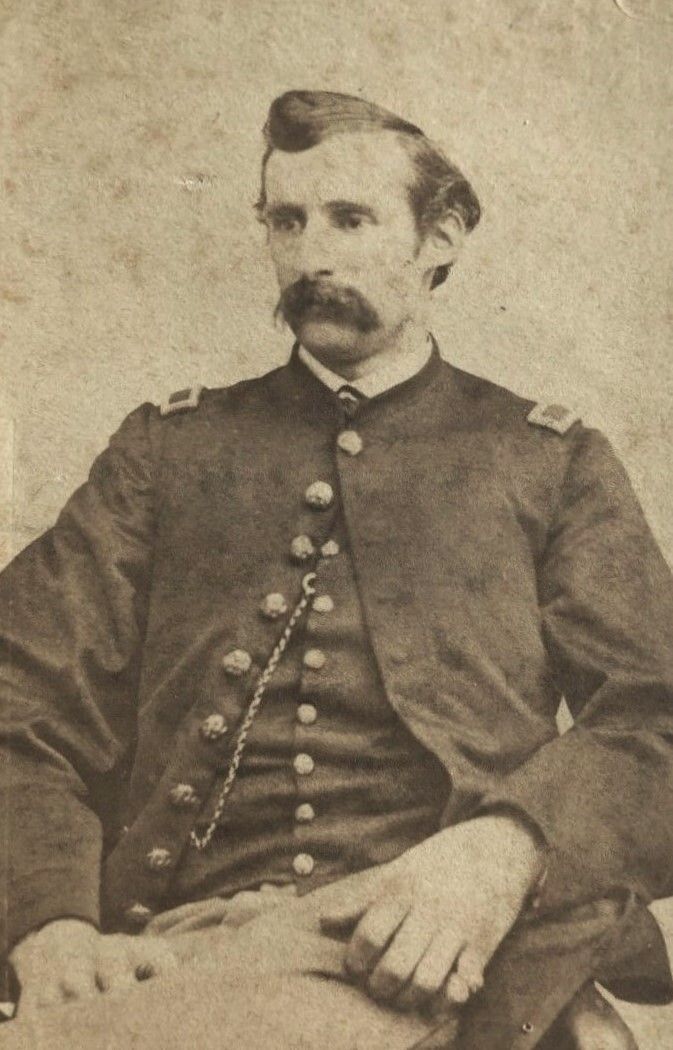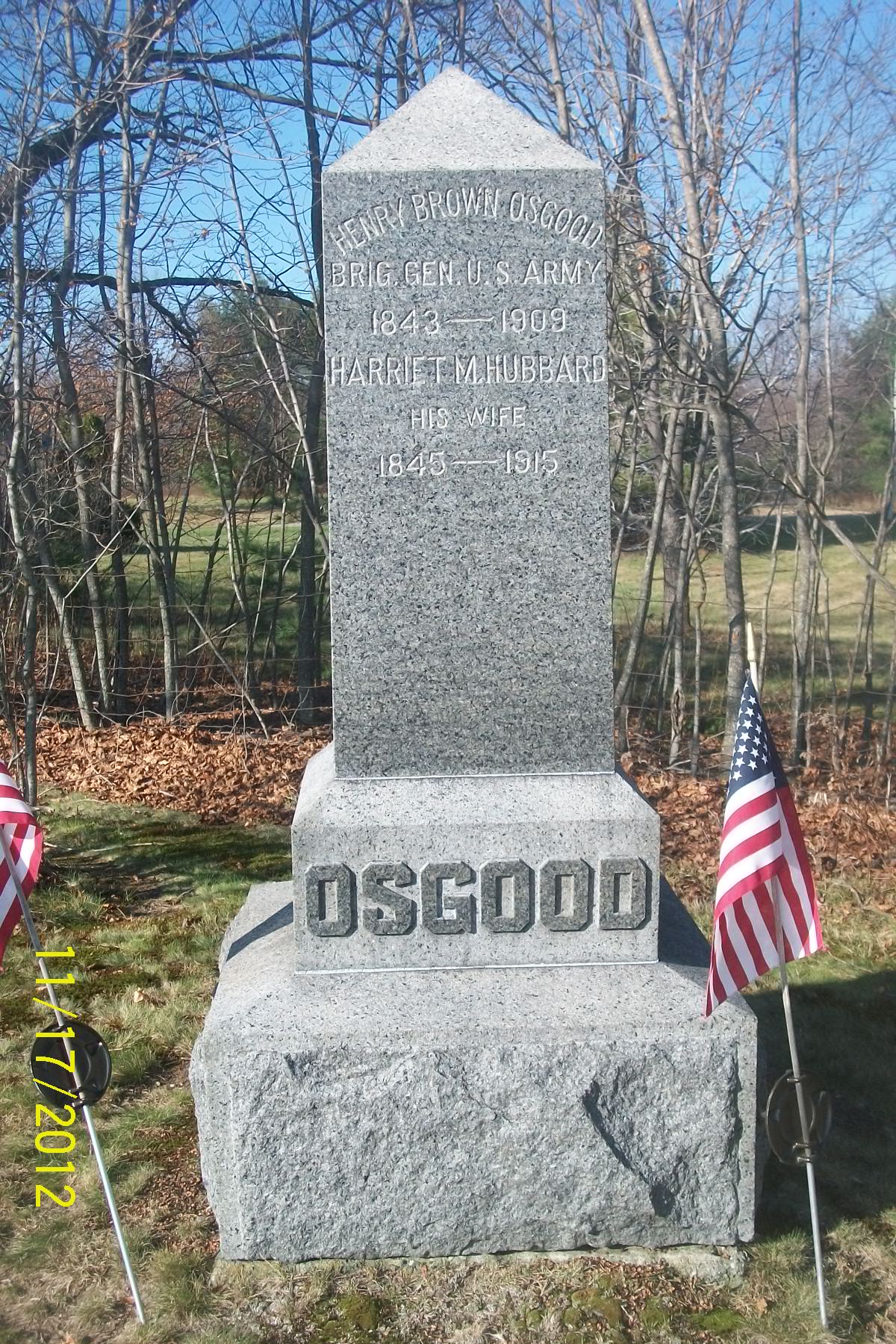When only eighteen years, old, General Osgood enlisted in the 27th Maine Infantry on September 30th, 1862, and was commissioned as a Second Lieutenant of his company and promoted to First Lieutenant on December 15th. The term of service of his regiment (nine months) having expired during the invasion of Pennsylvania by General Lee's army, 312 officers and men, including Lieutenant Osgood, volunteered to remain and did remain until the battle of Gettysburg had been fought and won. For this these men were given medals of honor.
He was appointed a cadet at the United. States Military Academy; reported on September 1st, 1863, and graduated June 17th, 1867. As a cadet he was a fair student, of excellent ability, and while he always maintained a good standing in his class and graduated with credit, he was not a hard student. The hazing of new cadets was the custom in his time, but every Plebe of his date always remembers him with affection, as he was their friend and adviser in all of their troubles. He was assigned to the Third Artillery upon graduation and like all of his class assigned to that arm, had to serve as a Lieutenant for over twenty years. It was soon discovered that he was a man of unusual energy, having a practical knowledge off many useful things and a sound common sense that makes in the army what we call a born quartermaster. Every Post Commander where he was stationed selected him as Post Quartermaster and Commissary, Ordnance Officer, etc., and to him fell all of the general work of the Post. Having an inherent love of trees and flowers, he accomplished much in landscape improvements at all Posts where he served. It has been said that from the refuse pile of brick and heating material at any Post, Osgood would soon have a pretty greenhouse filled with flowers. At Fort Monroe this certainly happened. His appointment as Captain & Commissary of Subsistence on October 5th, 1889, gave the Subsistence Department an officer already well trained in its work. The Spanish War found him on the Staff of the General of the Army, Washington, D.C., followed by duty in the field with troops in Florida; Chief and Purchasing Commissary, Department of Santiago, Cuba; Depot Commissary, Manila, Philippine Islands; as the Chief Commissary of various Departments in the United States until he was retired with the rank of Brigadier General on October 13th, 1907, at the age of sixty-four years, when on duty as Chief Commissary, Department of the East.
General Osgood's lovable disposition and strong personality, his thorough fitness for his work in the Army and conscientious regard for its performance made him a very valuable man wherever he served. His personal concern for the destitute Cubans at Santiago was very marked. Under his administration they were fed and cared for not only with promptness but with a personal sympathy that touched their hearts. The loss of his son Winchester Dana Osgood, who was killed while leading the Cuban insurgent field artillery against the Spaniards at Guaimara before the Spanish War, was a great blow and may have added to General Osgood's personal interest in the Cubans.
Upon his retirement from active service he settled at Stephentown, New York, upon the old homestead of his wife's family and with his accustomed energy started in to rebuild the old buildings, construct new dwellings for his help, etc., work that occupied his whole time, making him contented and happy.
He was a member of the Society of Cincinnati and of the Loyal Legion. He leaves a wife, two sons and two daughters, Henry Douglas and Edwin Putnam Osgood, Mrs. Basil Taylor and Mrs. Bernard Cogan.
When only eighteen years, old, General Osgood enlisted in the 27th Maine Infantry on September 30th, 1862, and was commissioned as a Second Lieutenant of his company and promoted to First Lieutenant on December 15th. The term of service of his regiment (nine months) having expired during the invasion of Pennsylvania by General Lee's army, 312 officers and men, including Lieutenant Osgood, volunteered to remain and did remain until the battle of Gettysburg had been fought and won. For this these men were given medals of honor.
He was appointed a cadet at the United. States Military Academy; reported on September 1st, 1863, and graduated June 17th, 1867. As a cadet he was a fair student, of excellent ability, and while he always maintained a good standing in his class and graduated with credit, he was not a hard student. The hazing of new cadets was the custom in his time, but every Plebe of his date always remembers him with affection, as he was their friend and adviser in all of their troubles. He was assigned to the Third Artillery upon graduation and like all of his class assigned to that arm, had to serve as a Lieutenant for over twenty years. It was soon discovered that he was a man of unusual energy, having a practical knowledge off many useful things and a sound common sense that makes in the army what we call a born quartermaster. Every Post Commander where he was stationed selected him as Post Quartermaster and Commissary, Ordnance Officer, etc., and to him fell all of the general work of the Post. Having an inherent love of trees and flowers, he accomplished much in landscape improvements at all Posts where he served. It has been said that from the refuse pile of brick and heating material at any Post, Osgood would soon have a pretty greenhouse filled with flowers. At Fort Monroe this certainly happened. His appointment as Captain & Commissary of Subsistence on October 5th, 1889, gave the Subsistence Department an officer already well trained in its work. The Spanish War found him on the Staff of the General of the Army, Washington, D.C., followed by duty in the field with troops in Florida; Chief and Purchasing Commissary, Department of Santiago, Cuba; Depot Commissary, Manila, Philippine Islands; as the Chief Commissary of various Departments in the United States until he was retired with the rank of Brigadier General on October 13th, 1907, at the age of sixty-four years, when on duty as Chief Commissary, Department of the East.
General Osgood's lovable disposition and strong personality, his thorough fitness for his work in the Army and conscientious regard for its performance made him a very valuable man wherever he served. His personal concern for the destitute Cubans at Santiago was very marked. Under his administration they were fed and cared for not only with promptness but with a personal sympathy that touched their hearts. The loss of his son Winchester Dana Osgood, who was killed while leading the Cuban insurgent field artillery against the Spaniards at Guaimara before the Spanish War, was a great blow and may have added to General Osgood's personal interest in the Cubans.
Upon his retirement from active service he settled at Stephentown, New York, upon the old homestead of his wife's family and with his accustomed energy started in to rebuild the old buildings, construct new dwellings for his help, etc., work that occupied his whole time, making him contented and happy.
He was a member of the Society of Cincinnati and of the Loyal Legion. He leaves a wife, two sons and two daughters, Henry Douglas and Edwin Putnam Osgood, Mrs. Basil Taylor and Mrs. Bernard Cogan.
Family Members
Sponsored by Ancestry
Advertisement
Advertisement














